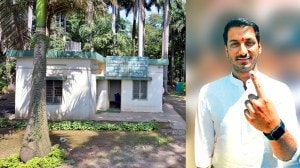Gujarat illegal migrants jailed in Cuba
MEHSANA, APRIL 9: The story of illegal migration of youths from villages in Gujarat to the US has assumed widespread implications now, wi...

MEHSANA, APRIL 9: The story of illegal migration of youths from villages in Gujarat to the US has assumed widespread implications now, with The Indian Express learning that Indians are in jail in Cuba and Mexico as well as the US, for travelling on false papers.
Police sources here said that 24 illegal migrants (23 from various places in Gujarat and one from Punjab) have been languishing in a jail in Guantamo Bay, Cuba since December 1998. Of those from Gujarat, two are from Ahmedabad, one from Surat and the rest from villages in Mehsana district.
They were caught by US naval authorities in December 1998 off the coast of Jamaica, while apparently being transported to the US in a private Cuba-based vessel.
After their capture, US Embassy officials in India sought, through the Ministry of External Affairs, police verification of their addresses and their antecedents, so that the process of their repatriation could be started. The police sent reports on all but two people — whose addresses werewrong — in the second week of January 1999, but none of these have yet returned home.
Two others, Alpesh Patel and Dinesh Kumar Patel of Makanaj village in Mehsana, have been interned in Mexico. They were reportedly caught 25 days ago while on their way to the US. Another Makanaj resident, Arvindbhai Patel, returned from Havana when he failed to enter the US a couple of months ago.
Chandubhai of Kalol, the father of Hitesh Patel who is in a Cuban jail, said he had no idea his son was going to the US; he had been told that Hitesh was going on a tour of South India. Ghanshyam Patel’s wife, living in Kadi taluka, gave a similar answer, indicating that she had been tutored to say this. However, all family members The Indian Express spoke to knew of their kin’s detention abroad.
The one common thread that connects all these people is their use of agents, who take care of the travel and other formalities. Though there are reportedly half-a-dozen agents operating in this business in Mehsana, thekingpin is said to be Dashrath Patel. He had been arrested in November 1998 on charges of cheating five persons by promising them migration to and employment in the US.
Patel is currently out on bail, and the case is still being investigated. During interrogation by the police, he admitted to having sent more than 100 persons to the US through fraudulent means; all of whom are currently working in various cities in the US. Two such youths from Makanaj have been there for the past three years, working in bakeries. They paid Rs 9 lakh each to agents, but have reportedly sent lakhs of rupees back to their families since.
Makanaj is also the native village of Narsinh Patel, whose death earlier this week uncovered the sordid and pathetic trail of illegal migration. Narsinh had illegally entered the US a year ago with the help of agents, worked for three months in a bakery before being arrested and serving an eight-month jail term. Officials said he sent back Rs 1 lakh to his family here in just threemonths.
The agents’ modus operandi, according to officials on the Dashrath case, is this: The youths are taken to Delhi and then flown to Havana on a three-month tourist visa. From there, they are taken to the Bahamas on a fortnight’s tourist visa. That’s when the illegal movement starts: from the Bahamas, the candidates are shipped to Miami on the Florida coast without visas. There, the migrants are picked up by their relatives or the Indian agents’ contacts. An alternative route is through Mexico and Haiti.
Interestingly, people here do not consider this form of migration a crime and are highly critical of police action against agents. “Migrants are not harming the interest of the nation; instead, they send us money in foreign exchange, adding to the prosperity. Why should anybody act against them?” asks Makanaj sarpanch Mafatlal Patel.
Vitthalbhai Prajapati of Makanaj village says it’s a gamble; if the villagers are able to enter the US, it’s good. If not, they come back. They are also awareof the risk of being caught and sent to jail and are mentally prepared for it.



- 01
- 02
- 03
- 04
- 05




























